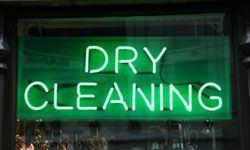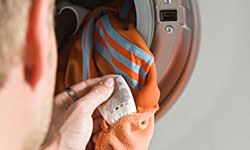
Key Takeaways
- Dry cleaning is a misnomer. Your clothes do get wet, just not with water. Instad, dry cleaners use perchloroethylene (perc), a solvent that is effective against oil-based stains.
- The tag "Dry Clean Only" is more of a recommendation than a strict rule. You can safely hand-wash many garments labeled as such, especially if the fabric is prone to shrinking rather than being damaged by water.
- Despite the convenience and effectiveness of dry cleaning, perc is toxic, raising environmental and health concerns. Alternatives like CO2 cleaning and liquid silicone are emerging.
Dry cleaning is one of the more mysterious aspects of everyday life. Even the name "dry cleaning" goes against everything we know about how clothes get washed. Adding to the mystery is that dry cleaning operations are secret, hidden behind a curtain of plastic garment bags, where magical machines perform some bizarre process that cleans our clothes without getting them wet.
If you've ever wondered what actually goes on in the back of a dry cleaner's, or even what "dry" cleaning actually means, read on for 10 things your dry cleaner doesn't want you to know.
Advertisem*nt
Contents
- Your Clothes Are Actually Getting Wet
- "Dry Clean Only" Doesn't Mean "Dry Clean Only"
- You're Paying to Maintain His Equipment
- Organic Doesn't Mean Eco-friendly
- At-home Dry Cleaning Is a Real Option
- Full Reimbursem*nts Are a No-go
- Your Lost Clothes Are Probably Gone Forever
- Your Complaint Only Has Half a Chance of Being Resolved
- Some Stains Just Don't Come Out
- Perc Is Toxic
10: Your Clothes Are Actually Getting Wet
Probably the biggest misconception about dry cleaning is that liquids don't actually play a part in the process. Dry cleaning doesn't mean no liquid; it means no water. Though dry cleaners do often use water for water-based stains like tomato soup and coffee, the most common practice is to drop clothes into a bath of perchloroethylene, or "perc," a colorless solvent that has the power to dissolve the stains that water can't, like gravy and tar.
So, why is it called "dry cleaning" if there are fluids involved? "Toxic chemical soup cleaning" just isn't as catchy.
Advertisem*nt
9: "Dry Clean Only" Doesn't Mean "Dry Clean Only"

We've all seen the warning "dry clean only" on clothes tags, and it might as well be a legal document for all the respect we give it. But "dry clean only" isn't an unbreakable rule. What that tag really means is "don't put me in the washing machine."
Legally, manufacturers are required to notify consumers of just one method of cleaning clothes, and dry cleaning is always a safe bet. But the real issue with fabrics like silk and wool is that they shrink during the rough agitations of the wash cycle -- it's not water that does the damage.
Gently hand-washing delicates (as long as you know that the dye won't bleed) is nearly always an option. Be careful, though. Certain fabrics like suede and velvet should never, ever be washed at home. Better leave those for the pros.
8: You're Paying to Maintain His Equipment
Sure, dry cleaning is expensive, but who else can get mayonnaise stains out of a pair of leather pants?
The fact is, dry cleaning is a massively pricey operation involving complex machinery and expensive industrial chemicals. And while ready-to-wear shirts and socks may be a snap to clean, once you move into the range of suede suits or cotton dresses with silk sashes and sleeves, it's not as simple as dumping the clothes into a machine and letting the solvent do its job. Specific treatments match specific stains, and clothes that have intricate designs or are made from expensive fabrics need loving, individual attention.
Advertisem*nt
So, are you paying too much? Between $7 and $10 is reasonable for most jobs, but if you love your dry cleaner -- he gets the stains out, respects your clothes and takes the time to sew on that extra button for you -- he's already priceless.
7: Organic Doesn't Mean Eco-friendly

Dry cleaning gets a bad rap for being environmentally unfriendly. And it's not necessarily undeserved. Perchloroethylene (perc), the most commonly used solvent in dry cleaning, is a heavy-duty industrial chemical that's both toxic to humans and a dangerous soil contaminant. But more on that later. What's worse are the supposedly "environmentally friendly" dry cleaners who are anything but.
Beware of words like "organic" and "natural" when they're used to describe dry cleaning. While the U.S. Food and Drug Administration (FDA) has strict regulations for what can be called organic food, there's no similar organization that polices the dry cleaning industry. For instance, perc and hydrocarbon solvents (one hydrocarbon brand is ironically named EcoSolv) can be called organic simply because they're made from chains of carbon. Under that definition, gasoline is "organic."
Advertisem*nt
For a real greener alternative, look for carbon dioxide cleaning, liquid silicone and professional wet cleaning with biodegradable detergents.
6: At-home Dry Cleaning Is a Real Option
With at-home dry cleaning, you pre-treat stains and then toss clothes inside a bag with a sheet that releases cleaning chemicals while being tumbled in your dryer. When clothes come out, the chemicals have loosened and absorbed the stains, leaving behind a light fragrance to cover any lingering odors.
But does at-home dry cleaning work as well as the real thing? While home dry cleaning systems can save you money, they're only first-aid kits for clothes. For the day-to-day problems like the smell of cigarette smoke and little droplets of wine and soup, at-home dry cleaner sheets work great. For more serious emergencies, you're still better off taking them to your local dry cleaner's.
Advertisem*nt
5: Full Reimbursem*nts Are a No-go

If a dry cleaner damages your favorite blouse, he should pay to replace it, right? Maybe not.
According to the International Fair Claims Guide for Consumer Textile Products, all clothes have a set lifespan, and they depreciate in value over that time. These lifetimes can be alarmingly short. A silk dress has a lifetime of two years, as do most dress shirts. Socks are only expected to be around for one measly year before they're kaput.
Advertisem*nt
Unfortunately, sentimental value is not a factor. You can only expect to get 100 percent of your money back for replacement if your clothes are less than four months old. After that, value drops significantly -- the replacement cost for a year-old blouse in average condition is only 60 percent of its original price, and once you're past the two-year mark, you can only expect 20 percent, tops.
4: Your Lost Clothes Are Probably Gone Forever
When a dry cleaner can't find your clothes, it probably means they're in the back somewhere. Though it's possible they were mislaid, what happens most of the time when clothes disappear is that they'll simply tag along in the wrong bag, unnoticed until that customer gets home.
And what does that customer do when she gets home? She puts the clothes in the closet. Sure, dry cleaners will tell you there's a chance that the clothes will turn up, and there is -- sort of. But who's going to remember to return a mystery shirt to the dry cleaner? It's best to make your peace, light a candle for your beloved garment and then try to cheer up with a shopping spree.
Advertisem*nt
3: Your Complaint Only Has Half a Chance of Being Resolved

According to the Better Business Bureau, customer complaints against dry cleaners were addressed in just less than 50 percent of cases in 2009. For the consumer, that means that if your clothes are damaged or you're treated rudely, your chance of receiving a satisfactory response is basically a coin toss.
This is why it's important to be on good terms with your dry cleaner -- if you're not getting the service you want, cut your losses and move on to someone who treats you better.
Advertisem*nt
2: Some Stains Just Don't Come Out
Dry cleaning is a pretty fantastic process, but it's not magic. If you spilled a glass of red wine on a white sweater, then left it in the closet for a month before taking it to the dry cleaner's, your options are either to kiss it goodbye or to pour the whole bottle over it and call it your new burgundy sweater. Natural fabrics like wool and cotton especially tend to absorb stains continuously over time, so the quicker you get these clothes to the dry cleaner's, the better.
Oil stains, too, become permanent very quickly. Watch out for cooking oil spatter and oil from clear salad dressings, as yellowing is a good sign of stain permanence.
Advertisem*nt
1: Perc Is Toxic

Perc, which we've established is the standard dry cleaning solvent, is a nasty piece of work. It does real damage when it leaches into the soil, where it can enter groundwater supplies. And that sweet smell that comes off clothes when they're fresh from the dry cleaner's? That's perc you're inhaling.
The good news, according to the Agency for Toxic Substances and Disease Registry, is that most people are at little risk for contamination. And the extremely low level of exposure that dry cleaners' customers get is relatively harmless. However, in situations where workers are exposed to high levels of perc on a regular basis, danger rises dramatically. While perc hasn't been shown conclusively to cause cancer in humans, the International Agency of Research on Cancer has designated it a probable human carcinogen. Let's put it this way -- if you have a bottle lying around, don't drink it.
"
Frequently Asked Questions
How has the dry cleaning industry responded to concerns about perc's toxicity?
The industry is gradually shifting toward more environmentally friendly solvents like CO2 and liquid silicone, which offer effective cleaning without the harmful effects of perc.
Are there any fabrics or items that you should never dry clean?
Yes, do not dry clean items with embellishments, certain plastics and some synthetic fabrics as the solvents may damage them.
"
Lots More Information
Related Articles
- 10 Things the Pizza Delivery Guy Doesn't Want You to Know
- 10 Things Your Hair Stylist Doesn't Want You to Know
- 10 Things Your Caterer Doesn't Want You to Know
- 10 Things Your Contractor Doesn't Want You to Know
Sources
- Agency for Toxic Substances and Disease Registry. "Tetrachloroethylene (PERC)." Agency for Toxic Substances and Disease Registry ToxFAQ. September 1997. (Oct. 1, 2010).http://www.atsdr.cdc.gov/toxfaqs/TF.asp?id=264&tid=48
- Better Business Bureau. "US BBB 2009 Statistics Sorted by Industry." Better Business Bureau. 2009. (Oct. 8, 2010).http://www.bbb.org/us/Consumer-Complaints/Statistics/
- The Claims Pages. "Textile Items Life Expectancy Chart (2016D)." Nationwide Publishing Company. 2004. (Oct. 8, 2010).http://www.claimspages.com/documents/
Cite This!
Please copy/paste the following text to properly cite this HowStuffWorks.com article:
Citation